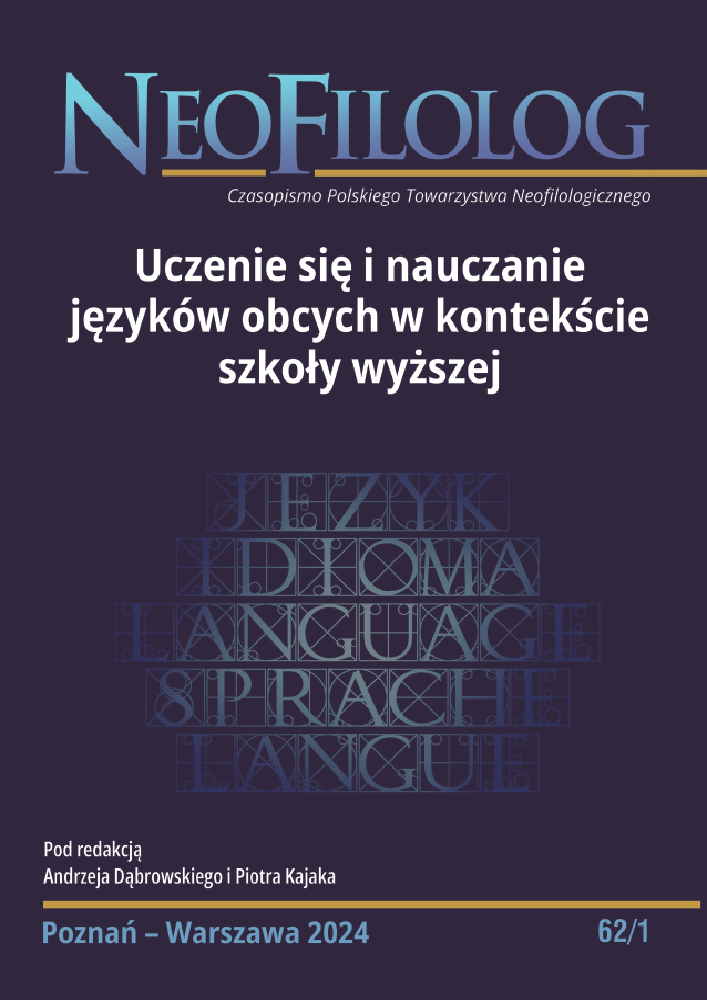Abstract
The importance of foreign language skills has increased in the labor market in recent years. A 2012 survey in Poland shows that effective communication and language skills are the most important skills sought from job applicants. It is therefore not surprising that private language schools and companies are offering more and more foreign language courses for professional purposes. In the context of thinking about informal learning of a language for specific purposes (LSP), it is worth reflecting on how a LSP teacher is prepared for work. It seems that attending workshops or practical training should be part of the repertoire of enhancing the professional competence of LSP teachers. However, discussions with experienced language teachers reveal that the reality is quite different. Therefore, given the growing demand for specialized language courses, diagnosis and discussion of the difficulties faced by LSP teachers is of academic relevance. The first part of this article presents a pilot study conducted in 2023 among LSP teachers. Following this, the difficulties of teaching professional languages will be presented. The last part refers to the presentation of methods, techniques and forms of work that can improve the methodological repertoire of LSP teachers.
References
Dudley-Evans, T., St. John, M. J. (1998), Developments in English for specific purposes: A multi-disciplinary approach. Cambridge: Cambridge University Press.
Dudley-Evans, T. (2001), English for specific purposes, (w:) Carter, R., Nunan, D. (red.), The Cambridge guide to teaching English to speakers of other languages. Cambridge: Cambridge University Press, s. 131–136. DOI: https://doi.org/10.1017/CBO9780511667206.020
Flinz, C. (2019), Aktuelle Fragen zur Forschung und Lehre, Zeitschrift für Interkulturellen Fachsprachenunterricht, 24 (1), s. 1–20.
Gajewska, E., Sowa, M. (2014), LSP, FOS, Fachsprache... Dydaktyka języków specjalistycznych. Lublin: Werset.
Gajewska, E., Sowa, M. (2019), Sposoby kształcenia nauczycieli języków specjalistycznych: od rzeczywistości edukacyjnej do rozwiązań systemowych. „Neofilolog”, nr 44/2, s. 221–235. DOI: https://doi.org/10.14746/n.2015.44.2.07
Gębal P. E. (2008), O kształceniu lektorów/nauczycieli języka polskiego jako obcego, „Języki Obce w Szkole”, nr 1/2008, s. 78–83.
Gębal P. E. (2019), Dydaktyka języków obcych. Wprowadzenie. Warszawa: Wydawnictwo Naukowe PWN.
Grabowska, M. (2023), L’apprentissage informel des langues étrangères. Paris, Éditions l›Harmattan.
Grucza, S. (2002), Badania nad językami specjalistycznymi w Niemczech (w:) Lewandowski, J. (red.), Języki specjalistyczne, t. 2: Problemy technolingwistyki”. Warszawa: Katedra Języków Specjalistycznych UW, s. 81–100.
Grucza S. (2007), Glottodydaktyka specjalistyczna. Część I. Założenia lingwistyczne dydaktyki języków specjalistycznych, „Przegląd glottodydaktyczny”, t. 23, s. 7–20.
Kic-Drgas, J., Woźniak, J. (2022), Perspektywy kształcenia nauczycieli języków specjalistycznych w Polsce. Warszawa: Wydawnictwo FRSE.
Krajka, J. (2015), Analiza potrzeb w planowaniu kursów językowych do celów zawodowych – o roli technologii społeczeństwa informacyjnego (w:) Sowa, M., Mocarz-Kleindienst, M., Czyżewska, U. (red.), Nauczanie jezyków obcych na potrzeby rynku pracy. Lublin: Wydawnictwo KUL, s. 221–238.
Głowacka, M., Helak, M., Kościńska, J. (2020), Konkurs Pamiętniki Pandemii. Założenia, wyniki, wstępne refleksje. Szczecin: WNUS.
Lesiak-Bielawska E. D. (2015), Specyfika pracy nauczyciela języka specjalistycznego (JS) a implikacje dla procesu kształcenia (w:) Sowa M., Mocarz-Kleindienst M., Czyżewska U. (red.), Nauczanie języków obcych na potrzeby rynku pracy. Lublin: Wydawnictwo KUL, s. 380–392.
Róg, T. (2017), Kompetencja interkulturowa. Z. 1, Teoria w pigułce. Warszawa: Ośrodek Rozwoju Edukacji.
Sowa, M. (2016), Nauczyciel języka czy nauczyciel zawodu? Kompetencje nauczyciela języka specjalistycznego (w:) Łącka-Badura, J. (red.), Języki specjalistyczne w badaniach i praktyce. Katowice: Wydawnictwo Uniwersytetu Ekonomicznego w Katowicach, s. 139–156.
Sowa M. (2022), Potrzeby nauczycieli języków obcych specjalistycznych względem przygotowania i realizacji procesu dydaktycznego. Próba diagnozy (w:) Kic-Drgas,J. Woźniak, J. (red.), Perspektywy kształcenia nauczycieli języków specjalistycznych w Polsce. Warszawa: Fundacja Rozwoju Systemu Edukacji, s. 30–55.
Ślawska, M. (2022), Warsztat pracy nauczyciela języka angielskiego zawodowego (w:) „Języki Obce w Szkole”, nr 2/2022, s.79–84.
Wilczyńska W., Mackiewicz M., Krajka J. (2019), Komunikacja międzykulturowa: wprowadzenie. Poznań: Wydawnictwo UAM.
Woodrow, L. (2018), Course design in English for specific purposes. London: Routledge. DOI: https://doi.org/10.4324/9781315143279
License
Copyright (c) 2024 Marta Wojakowska

This work is licensed under a Creative Commons Attribution-NoDerivatives 4.0 International License.
Authors
Authors of texts accepted for publication in Neofilolog are required to complete, sign and return to the Editorial team’s office the Agreement for granting a royalty-free license to works with a commitment to grant a CC sub-license.
Under the agreement, the authors of the texts published in Neofilolog grant Adam Mickiewicz University in Poznań a non-exclusive, royalty-free license and authorize the use of Attribution-NoDerivatives 4.0 International (CC BY-ND 4.0) Creative Commons sub-license.
The authors retain the right to the free disposal of the work.
Users
Interested Internet users are entitled to use works that have been published in Neofilolog since 2017, under the following conditions:
▪ attribution – obligation to provide, together with the distributed work, information about the authorship, title, source (link to the original work, DOI) and the license itself.
▪ no derivatives – the work must be preserved in its original form. Without the author's consent, it is not possible to distribute the modified work in the form of translations, publications, etc.
Copyrights are reserved for all texts published since 2017.
Miscellaneous
Adam Mickiewicz University in Poznań retains the property right as a whole (layout, graphic form, title, cover design, logo etc.).

